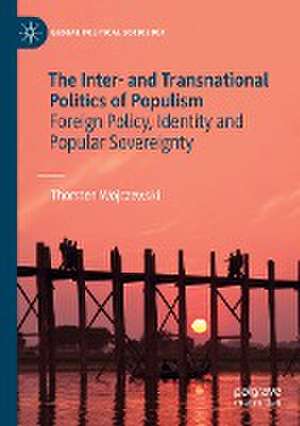The Inter- and Transnational Politics of Populism: Foreign Policy, Identity and Popular Sovereignty: Global Political Sociology
Autor Thorsten Wojczewskien Limba Engleză Paperback – 3 ian 2024
| Toate formatele și edițiile | Preț | Express |
|---|---|---|
| Paperback (1) | 727.18 lei 6-8 săpt. | |
| Springer International Publishing – 3 ian 2024 | 727.18 lei 6-8 săpt. | |
| Hardback (1) | 732.40 lei 6-8 săpt. | |
| Springer International Publishing – 2 ian 2023 | 732.40 lei 6-8 săpt. |
Preț: 727.18 lei
Preț vechi: 886.80 lei
-18% Nou
Puncte Express: 1091
Preț estimativ în valută:
139.16€ • 144.75$ • 114.89£
139.16€ • 144.75$ • 114.89£
Carte tipărită la comandă
Livrare economică 15-29 aprilie
Preluare comenzi: 021 569.72.76
Specificații
ISBN-13: 9783031168505
ISBN-10: 303116850X
Ilustrații: VIII, 352 p. 1 illus.
Dimensiuni: 148 x 210 mm
Greutate: 0.43 kg
Ediția:1st ed. 2023
Editura: Springer International Publishing
Colecția Palgrave Macmillan
Seria Global Political Sociology
Locul publicării:Cham, Switzerland
ISBN-10: 303116850X
Ilustrații: VIII, 352 p. 1 illus.
Dimensiuni: 148 x 210 mm
Greutate: 0.43 kg
Ediția:1st ed. 2023
Editura: Springer International Publishing
Colecția Palgrave Macmillan
Seria Global Political Sociology
Locul publicării:Cham, Switzerland
Cuprins
Chapter 1: Introduction: Populism and International Relations .- Chapter 2: The Populist Challenge to International Relations: Concept-Stretching, Methodological Nationalism and the Omission of Popular Sovereignty.- Chapter 3: Theorizing the Relations between Populism and Foreign Policy: A Discursive, Poststructuralist Approach.- Chapter 4: Addressing Shortcomings in the Laclauian Discursive Approach to Populism: Ontology, Radical Contingency, Affect and the Role of Populist Leaders and Antagonism .- Chapter 5: Right-wing Populism and Foreign Policy in the United States, Germany and India.- Chapter 6: Left-wing Populism and Foreign Policy in the United States, Europe and Venezuela .- Chapter 7: International and Transnational Populism: Cross-border Collaboration and Identity Construction.- Chapter 8: Conclusion: Re-Conceptualizing and De-centring Populism in International Relations.
Notă biografică
Thorsten Wojczewski is Lecturer in International Relations at Coventry University, UK
Textul de pe ultima copertă
Populism has lately experienced a meteoric rise to become one of the most widely used terms in academic and wider public discourses and a supposedly defining feature of both domestic and world politics. Situated at the intersection of International Relations (IR), Political Theory and Comparative Politics, this book makes a critical intervention into the burgeoning IR scholarship on populism and problematizes the often hyperbolic and sweeping usage of the term as a general descriptor for non-centrist politics of different persuasions. The book seeks to move into a different theoretical direction and broaden the empirical focus of existing IR research. Theoretically, it bridges the gap between theories of populism and IR by bringing the Laclauian, discursive approach and IR poststructuralism together in a theoretical framework. The proposed framework moves away from the search for the policy preferences and impact of populism, and instead conceptualizes foreign policy and worldpolitics as potential sites for practicing populism, ranging from the articulation of societal grievances to the construction of populist identities such as ‘the people’. Empirically, the book takes IR scholarship beyond the predominant focus on the populist radical right and single-country and -region studies. Building on the discourse analysis of an original data set, it offers a comparative analysis of right-wing and left-wing populist discourses in different world regions as well as populist cross-border collaboration and identity construction.
Thorsten Wojczewski is Lecturer in International Relations at Coventry University, UK
Caracteristici
Theorizes the relationship between populism and international relations Analyses right- and left-wing populist discourses in the United States, Europe, India and Latin America Discusses how populism affects and is affected by foreign policy and world politics










